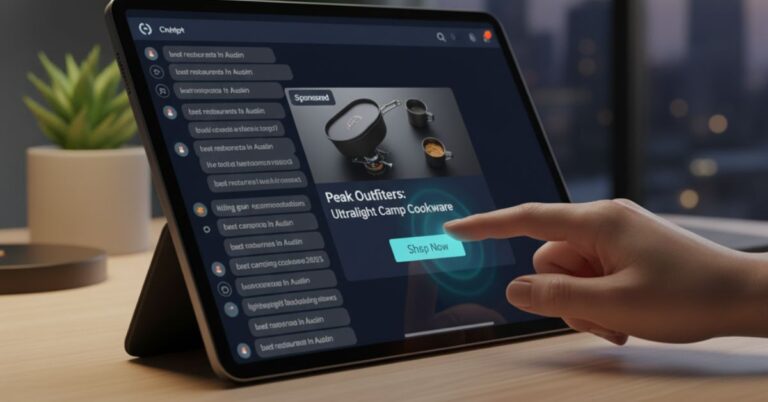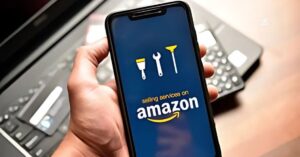
The emergence of advertising on generative AI bots signals a fundamental change for sellers, requiring a new strategy that focuses on influencing conversations rather than just bidding on keywords.
For years, brands have relied on search engine advertising to reach customers at the moment they are looking for a product. It has been the most reliable, if competitive, channel for driving traffic and sales.
Now, that entire system is being challenged by the rise of AI assistants. With 62% of U.S. adults already using AI weekly, your target audience is having conversations where your brand is completely invisible.
The problem isn’t just showing up in a new place; it’s that advertising within a conversation requires a completely new playbook.
OpenAI Moves Closer to Monetizing ChatGPT Through Ads
Patrecia Meliana, Content Grip"OpenAI already has the tech interface (ChatGPT), the user base (700 million weekly active users), and now, possibly, the campaign engine to power autonomous ad execution."
OpenAI is making concrete moves to turn its popular AI chatbot into a full-fledged advertising platform. As Danny Goodwin wrote in his Search Engine Land article, the company is actively staffing up to build the infrastructure required for this new venture.
This initiative aims to monetize the platform’s massive audience, which reached 700 million weekly active users as of August 2025. Reports suggest OpenAI plans to introduce ads for its free users by 2026, creating a powerful new channel for advertisers.
To spearhead this effort, the company is hiring a Growth Paid Marketing Platform Engineer for a new ChatGPT growth team. This position is responsible for creating the essential backbone of an in-house system for brands to run and manage campaigns directly.
The new ad platform’s foundational technology will be designed to make marketing investments more measurable and automated. Key projects for the role include:
- Developing tools for campaign management.
- Integrating with major existing ad platforms.
- Building systems for real-time attribution and reporting.
- Creating APIs and data pipelines to optimize ad spend.
The long-term vision suggests a highly autonomous ad product where brands could input their goals and have ChatGPT plan, buy, and measure campaigns. This move signals that advertisers will soon need to seriously consider ChatGPT as a primary paid media channel to reach customers.
ChatGPT Ads Signal a Strategic Shift for Marketers
According to a podcast episode of Performance Marketing World, this long-anticipated move is forcing marketers to consider what AI-powered advertising will look like.
This development marks a fundamental change in performance marketing, shifting the focus from chasing clicks to influencing decisions within a conversation. Unlike traditional search, which presents multiple labeled ads, AI assistants deliver narrower, more curated results.
This new format presents significant challenges for brand safety and user trust. There are concerns that users may struggle to distinguish between genuine recommendations and paid advertisements within an AI’s response.
The risk of AI “hallucinations,” where the model generates false information, adds another layer of complexity. A sponsored product recommendation followed by inaccurate details could cause significant damage to a brand’s reputation.
For Amazon sellers, this new channel will require a different approach than traditional pay-per-click campaigns. Success will depend on understanding the context and user intent within a dialogue, not just on keywords.
Sellers must reassess their strategies as this new advertising format becomes available, often in collaboration with their Amazon agency. Key considerations will include:
- Ensuring product information is accurate to prevent AI hallucinations.
- Maintaining strong brand consistency for AI-generated responses.
- Rethinking budget allocation across different advertising platforms.
- Leveraging multimodal signals like images and video more effectively.
This move follows a broader industry pattern, with companies like Google already introducing ads into their AI search experiences. ChatGPT will also likely adopt a two-tier system, offering a paid subscription for an ad-free experience, a model other tech giants are exploring.
Google Expands AdSense to AI Chatbots
OpenAI is not alone in this paid ad quest, as Ryan Whitwam reported in Ars Technica earlier this year that Google is quietly testing ads in AI chatbots. The search giant is actively preparing for a future where AI conversations could become as important as traditional search results for its business.
Google began adapting its highly profitable AdSense platform for chatbot experiences in 2024, running initial tests with select AI startups like iAsk and Liner. Following those trials, the company is now allowing more chatbot developers to integrate these ads into their conversational AI products.
This strategic pivot is driven by the immense cost of operating generative AI, a challenge faced by all major tech players. With billions spent annually on the necessary computing power, advertising presents a direct path to making these popular consumer AI tools financially sustainable.
Beyond advertising, Google also appears to be developing more advanced subscription plans to generate revenue. Users have noted hints of a new, more expensive “Gemini Ultra” tier, suggesting a strategy that combines ads for free users with more powerful features for paying subscribers.
While Google’s own Gemini chatbot remains ad-free for now, these developments indicate that the era of clean, no-cost AI experiences is likely ending. The industry is clearly moving toward a model where users will either see ads or pay for premium, ad-free access.
Google Rolled Out Ads in AI Overviews
In May 2025, Google officially announced it is integrating Search and Shopping ads into its own generative AI features. As reported by Will Melton of Xponent21, these ads now appear in the new AI Overviews and AI Mode in Google Search.
This move means even informational searches can surface paid product ads directly within AI-generated answers. For advertisers, this creates a new, high-visibility opportunity to reach consumers during their research phase.
Google's AI Ads to Expand Internationally by Year-End
Google is set to expand advertising within its AI Overviews beyond the United States before the end of this year. Anu Adegbola wrote in a Search Engine Land report that the company confirmed the rollout to select English-speaking markets during its recent Google Access event.
Perplexity Pauses AI Ads, Highlighting Monetization Hurdles
While some tech giants are just beginning their ad journey, one early pioneer is hitting the brakes. As Trishla Ostwal reported on Adweek, Perplexity, which began experimenting with native ad placements last year, has now paused accepting new advertisers to rethink its entire monetization strategy.
A company representative confirmed at Advertising Week that ads are not currently on the roadmap for its AI browser, Comet. This move follows the departure of its head of ad sales in August, signaling a significant change from previous plans to scale the ad business.
The decision to reassess the program stems from several key problems that emerged during its initial testing phase. Both advertisers and publishers have reported significant challenges with the platform’s ad model.
Key issues included:
- An inability for advertisers to measure performance metrics like click-through rates and return on ad spend.
- A lack of robust advertising tools comparable to those on established platforms.
- Little meaningful income generated for publishers participating in the revenue-sharing program.
The ad program’s financial impact was minimal, further justifying the pause in strategy. In 2024, advertising reportedly generated only $20,000 of the company’s $34 million in total revenue.
With advertising on hold, Perplexity is now focusing on building out its ecosystem around its web browser, Comet. This separate initiative involves partnerships with trusted publishers and was recently made free for all users.
Web FX"Paid search ads can increase brand awareness by up to 80%."






